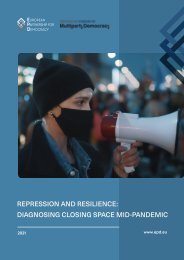Thinking Democratically: A Comprehensive Approach to Countering and Preventing Shrinking Space
You also want an ePaper? Increase the reach of your titles
YUMPU automatically turns print PDFs into web optimized ePapers that Google loves.
This leads <strong>to</strong> a complete lack of representation <strong>and</strong> inclusiveness, where politics is reserved for the<br />
rich <strong>and</strong> parties serve as a temporary vehicle <strong>to</strong> attain elected office. When the winners are in power,<br />
they have no loyalty whatsoever <strong>to</strong> the party neither <strong>to</strong> their elec<strong>to</strong>rate, <strong>and</strong> will do anything <strong>to</strong> keep<br />
the deeply flawed system that got them elected in place, so as <strong>to</strong> ensure future wins.<br />
Even though elections have been organised <strong>and</strong> conducted in a relatively transparent manner, there<br />
is no elec<strong>to</strong>ral accountability at all, as congress is elected by means of closed lists controlled by<br />
parties. Congressmen lead the efforts <strong>to</strong> restrict civic space, through laws that restrict civil society’s<br />
ability <strong>to</strong> operate, amongst others with control mechanisms requiring unnecessary permits <strong>and</strong><br />
approval for projects. The business <strong>and</strong> criminal elite has also coopted several judicial bodies in order<br />
<strong>to</strong> protect corrupt networks <strong>and</strong> ensure impunity.<br />
In response <strong>to</strong> corruption sc<strong>and</strong>als <strong>and</strong> restrictive actions by the government, coalitions of citizens,<br />
media, NGOs <strong>and</strong> civil society groups have been relatively successful in mobilising people in strikes<br />
<strong>and</strong> countering such attacks. However, overall there is very little trust in democratic institutions, as<br />
evidenced by the low voter turnout in the 2019 elections.<br />
6.7 Zimbabwe<br />
While the removal from power of long-st<strong>and</strong>ing President Robert Mugabe created hopes for an<br />
opening of democratic space, the dynamics of restricting space for contestation have not<br />
fundamentally changed. As Zimbabwe has veered between various forms of authoritarian rule since<br />
independence, civil society has almost always operated under restrictions in exercising their<br />
fundamental freedoms, with waves of repression (2008, 2018-2019) <strong>and</strong> periods of relative opening<br />
(2000, 2018). While overall the general environment for civil society <strong>and</strong> the opposition is less<br />
repressive than it was around 2008, with fewer arrests <strong>and</strong> less use of repressive legislation, the<br />
current regime has fallen back in<strong>to</strong> authoritarian patterns of repression at certain occasions, most<br />
notably during post-election protests in August 2018 <strong>and</strong> during protests in January 2019.<br />
In the early 2000s, Zimbabwe adopted a series of laws <strong>to</strong> limit civic space: a law imposing excessive<br />
burdens <strong>and</strong> restrictions on NGOs (the Private Voluntary Organisations Act); a law limiting freedom<br />
of press <strong>and</strong> media (the Access <strong>to</strong> Information <strong>and</strong> Protection of Privacy Act); <strong>and</strong> a law used <strong>to</strong><br />
restrict freedom of assembly (the Public Order <strong>and</strong> Security Act). These laws were later amended <strong>to</strong><br />
include more categories of ac<strong>to</strong>rs <strong>and</strong> types of activities <strong>and</strong> applied both by the Mugabe regime <strong>and</strong><br />
in the post-Mugabe era. The Public Order <strong>and</strong> Security Act was, for instance, used by the military in<br />
August 2018, when the army fatally shot protes<strong>to</strong>rs demonstrating against irregularities in the<br />
elec<strong>to</strong>ral process. Existing laws such as a rural by-law have also been used <strong>to</strong> target specific people,<br />
including human rights defenders. Violence has also been used against civil society, protes<strong>to</strong>rs,<br />
opposition figures <strong>and</strong> media ac<strong>to</strong>rs, with a major chilling effect on dissenting voices. For instance,<br />
57

















